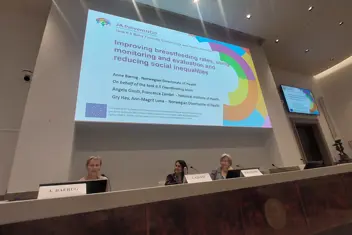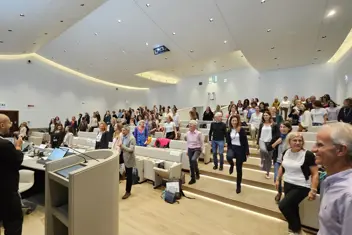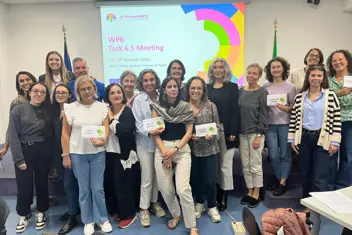The Work Package on Healthy Living Environment (WP6) under JA PreventNCD focuses on implementing integrated interventions to address the main causes of cancer and other NCDs. These interventions span different settings and life stages, with a strong emphasis on community action and co-creation with stakeholders. WP6 aims to build sustainable infrastructures at the local level, promoting health equity by empowering communities to support healthy living environments for all.
Focus on Baby-Friendly Community & Health Services (BFC&HS)
One of the key initiatives within WP6 is Task 6.5: Baby-Friendly Community and Health Services. This task is dedicated to supporting early childhood development by creating breastfeeding-friendly environments and community health services that empower women, fathers/partners, families and healthcare professionals. The Baby-Friendly Community Health Services, based on the WHO/UNICEF Baby-Friendly Standard, has been shown to increase the duration of breastfeeding, and was evaluated as a Best Practice by the EU Commission in 2022. By protecting, promoting and supporting breastfeeding and offering responsive caregiving, the initiative plays a vital role in reducing the risk of NCDs, particularly among vulnerable groups.
In October 2024, two significant events related to this task were held in Rome, providing a platform to share best practices and progress toward creating healthier environments for children and families.

Photo from the Baby-Friendly Initiative Network meeting
Italian Baby-Friendly Network Meeting: Supporting Families and Healthcare Professionals
On October 9th, 2024, the Italian Committee for UNICEF and the Italian National Institute of Health (ISS) held the annual Baby-Friendly Initiative Network meeting at the ISS Pocchiari Auditorium in Rome. The Baby-Friendly Initiative (BFI) is a global movement designed to improve infant health by promoting breastfeeding and supporting women, fathers/partners and families during the early years of a child's life.
This year's meeting brought together experts, health professionals, and policymakers to discuss a wide range of topics, including breastfeeding promotion, responsive complementary feeding, the ethical management of sponsorship, and addressing environmental pollution's impact on infant health. "Green feeding" was a major theme, highlighting sustainable, eco-friendly practices for infant nutrition, which aligns with broader efforts to reduce environmental pollution and promote health.
Participants emphasized the importance of empowering healthcare professionals to provide the necessary support for women, fathers/partners and families, sharing best practices and strategies for building breastfeeding-friendly environments across different settings.

Photo from the Baby-Friendly Initiative Network meeting
First In-Person Meeting of Baby-Friendly Community & Health Services
Following the network meeting, on October 10th and 11th, representatives from seven European countries—Greece, Italy, Lithuania, Norway, Slovenia, Spain, and Ukraine—gathered for the first in-person meeting of Task 6.5: Baby-Friendly Community & Health Services. This initiative is a crucial part of the broader WP6 objective to implement community-based health services that can support breastfeeding and early childhood development across Europe.
The meeting featured insights from international experts, including Clare Farrand from the WHO and Rafael Pérez-Escamilla from Yale University, who provided key findings on how breastfeeding can help prevent non-communicable diseases. Countries participating in the initiative shared their progress and challenges in implementing Baby-Friendly community health services. The meeting also allowed for discussions on how to adapt the Baby-Friendly model to different local contexts, ensuring it can be successfully implemented across diverse communities.
A multidisciplinary and trans-sectoral approach was emphasized, encouraging collaboration between healthcare professionals, community stakeholders, and policy makers to support women, fathers/partners and families at all levels. The second day of the meeting focused on refining the pre-implementation guidance for Baby-Friendly Community Health Services, aiming to make these services more accessible and effective for families across Europe.

Photo from the first in-person meeting of Task 6.5
Building Healthier Communities for Future Generations
The Baby-Friendly Community & Health Services initiative under WP6 plays a vital role in promoting health equity by fostering environments that support early childhood development, particularly through breastfeeding. By engaging communities, health professionals, and policymakers, this initiative is laying the groundwork for healthier future generations. The events in Rome highlighted the progress made, the challenges ahead, and the importance of collaboration in building sustainable, equitable health services for all families.
